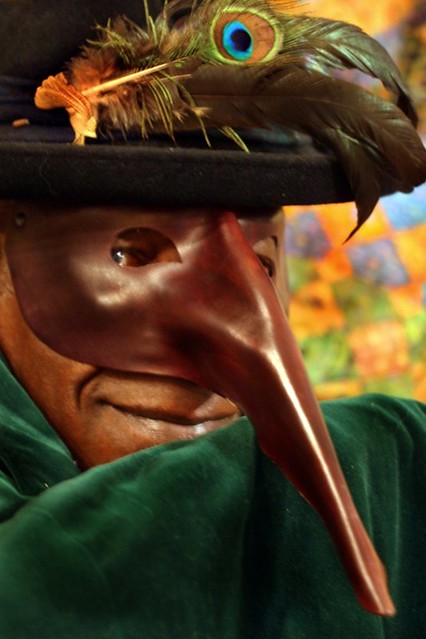Aim of Task:
To practice "repetition," a very important technique developed by Meisner.
Description of Task:
Meisner was the person who, in the 20th century, developed
method acting in the United States. Although he based his techniques on Stanislavsky, his techniques did not require a lot of psychological involvement from the actor like Stanislavsky's techniques do.
So what we did to practice Meisner's repetition exercises is first, find a partner. Now, once we had a partner, Steve showed us what the dynamic of the exercise was going to be. We chose a phrase both of us would take turns to repeat. So partner would say the phrase, then partner B would repeat the same phrase, then partner A would repeat the same phrase and so on and so forth until our teacher told us to stop. We did it for about 2 minutes. The exercise seems very simple, but it can become hard! Repeating the
same phrase over and over again can confuse you and make my your tongue
tangled. It can also become a little bit annoying to listen to your
partner say the same exact phrase over and over again. It seems simple
but it's complex once you do it!
Then, Steve told us that each one of us would pick an specific phrase. Partner A and Partner B will choose an specific phrase, like an observation about the environment, and repeat over an over again; Partner A will say his phrase then Partner B will say his phrase and so on and so forth. We repeated our phrases for about 2 minutes. This one was less annoying than the other exercise, perhaps because phrases were alternated between each other.
Now, our teacher told us to change the dynamic a little bit. We would keep on saying things repeatedly but now, we would not repeat the same phrase but we would change the phrase as we felt it was appropriate. Impulse is the word Steve used for this, he told us to keep on saying things repeatedly but only change the phrase if we felt an impulse to do so. We did this for another 2 minutes, approximately. I basically only changed my phrase when I noticed something different in my partner, most of my phrases were like an observation I was making about my partner, like "your hair is black" or "you are short." At some point though, I started saying "you are annoying" and "I want this to end" because I was becoming desperate of hearing my partner talk to me repeatedly.
Other classmates went to the point where they started shouting at their partners things like "leave me alone" because they were so annoyed by them. Another interesting comment that one of my classmates made is that it was hard for him to change phrase because most of the time he would feel an impulse to change his phrase only halfway while he was pronouncing his phrase, so he ended up not changing his phrase because by the time it was his turn to talk again, he had lost the impulse. Our teacher told us that, in that case, we shouldn't say anything because the impulse was already gone. I felt a little bit like this sometimes, but I changed my phrase anyway.
Now, after doing this, we changed the dynamic a little bit. My partner and I established a relationship and a role each one of us would use. We decided we would be co-workers. Our teacher told us that one partner had to go outside, I went outside. The other partner had to stay inside and perform a task that requires mental focus, like doing homework. Now, the ones who were outside, our teacher told us to imagine a before time, something that had just happened referring to the relationship we had agreed on. After we thought about our before time, we went in and did the repetition exercise again.
The before time I thought about was that I had been talking to our boss and he was not very happy about the performance of the company and he would have to fire one of us. So when I came in, I started saying "the boss" to which he replied "what." As I felt like he was not paying, I had an impulse to change my phrase to something he would pay more attention to like "one of us, danger." I felt a little bit of frustration as I couldn't capture his attention. My partner also changed his impulses as the exercise continued.
Now, after approximately three minutes, our teacher stopped us. He told us that the same partner that had gone outside of the classroom should go out again. Now, he told us that we should think about an objective, something we should convince our partner about.
The objective I thought about was that I wanted to convince him that we should go and talk to our boss about what had happened, so that none of us had to leave.
I went inside and I started my phrases pretty much the same. I felt more involved though, because I now had an objective. My facial expression changed as I saw that my partner did not pay attention to me, it was a face of kind of being worried and frustration - worried because one of us might have to leave his job and frustrated because I didn't feel like my partner was paying me attention.
I felt like the exercise I did with my partner was good but perhaps not as involved as the exercise other people did. I could see other people standing up and shouting and each other. Their rhythms, tone of voice, changed. I didn't feel a lot of change for our couple, though.
Reflection:
I think this is a good exercise to get into the emotional state of the scene because it really forces you to focus on what you want to do. In "real life," most of your actions are motivated by an objective, things are normally done for a reason. By doing these exercise, you get used to that, to remember that since this is realistic acting you should also have an objective on stage. Objectives are also useful on stage when you may forget your lines: if you know your objective, you can still communicate the same message. Focusing on the objective also makes your body language go according to your words. It can be as powerful as Stanyslavski's emotional memory but not as hard, psychologically.
Conclusion:
I think something that Meisner and Stanislavsky have in common is that they both try to get you fully focused on the current moment, they both try to coordinate your physical actions and what you say with what is happening at the moment; and that definitely helps making the scene more realistic because in real life, as things happen naturally, you are always in the moment.




























